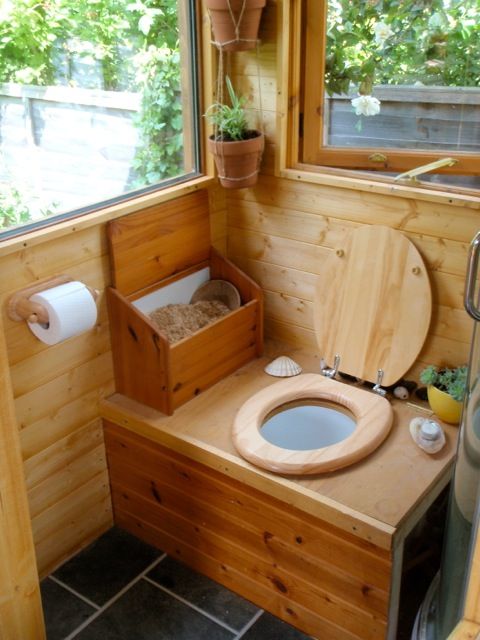Editor’s note: We asked composting-toilet enthusiast and expert Ned Doyle to describe the merits of his approach, in light of his upcoming workshop on the topic. The opinions he expresses are his own. However, readers should be aware that there are no allowed uses of composting toilets in residences in Buncombe County, according to commercial plan reviewer Bob Haynes.
Humanity, now over seven billion people strong, produces annually an estimated 560 million tons of solid body waste and about 3 trillion liters of liquid waste, according to Dan Chiras, Ph.D., author of The Scoop on Poop. Where does it go, what are the impacts and how do we deal with all of this so-called “waste”? An upcoming Living Web Farms workshop that I am co-teaching, “Building and Maintaining a Composting Toilet,” will address all of the above.
Understanding poop
First, let’s acknowledge that most folks have some level of what Joe Jenkins, author of The Humanure Handbook, has termed “fecophobia”: the fear of feces, dealing with it and even talking about it. Yet our bodily functions are a fact of life and entirely natural. All living organisms take in organic materials and excrete organic materials; it’s the way nature works. “Only death and taxes are inevitable,” goes the old saying, but we can also add the “urge to purge.” When you have to go, you have to go!
From a narrow, human perspective, the most important aspect of dealing with excrement is the prevention of disease from dangerous pathogens. The modern flush toilet is extremely effective at accomplishing this goal, which is why it’s been called by some the world’s most important public health innovation. In Western North Carolina, our urban infrastructure for handling sewage is expensive, and relies on modern technology, electric power and highly trained operators. For the most part, it works well to protect us from disease pathogens.
The history of toilets and waste disposal dates back thousands of years, to ancient Babylonia, Crete, Egypt, Greece and the Roman Empire. Asian cultures have appreciated and dealt with their excrement as a resource for thousands of years, collecting and returning it to farms and agricultural fields as fertilizer. As cities developed higher population densities, the need for waste disposal became evident across many cultures, from a health standpoint alone.
From a global environmental perspective, the impacts of flushing away our sewage have become severe. Human sewage is a potent source of pollution that is implicated in the loss of coral in the oceans and contamination in waterways and groundwater. Waste material from sewage treatment also adds to landfills.
Meanwhile, an important source of nutrients in the natural biological cycle is being wasted, at great cost. Human waste contains nitrogen, phosphorus, potassium, ammonia and other essential elements for agriculture. We primarily manufacture fertilizers containing these nutrients from fossil fuels and mined phosphorus, with the byproducts of fertilizer use ending up in landfills or pumped into waterways.
When conventional sewage-handling systems overflow or become inoperative due to power outages or severe weather, such as we saw this month with Hurricane Matthew, the immediate danger of disease is very real. Nearly 1,000 people were tragically killed in Haiti from the rain and winds, but the death toll from cholera may be thousands more, according to the World Health Organization. Knowing how to cope without flush toilets, even as a short-term solution, can be critical for a family or community.
Answering Nature’s call
So, how can we protect human health and address these problems? Fortunately, an excellent answer is provided by nature: composting! The same composting processes that many gardeners and farmers utilize — done properly — will destroy disease-causing human pathogens, produce valuable fertilizer and save clean water that would otherwise be flushed away. Bacteria, fungi, earthworms and more have been recycling the resources of all life forms on our planet for millions of years. It’s actually very simple — if done properly. Yes, that point has been repeated, because it’s the key to addressing sanitation concerns.
In a conventional garden-composting process, the essential keys are the temperature of the compost, the need for oxygen, moisture at the right level and a good balance of carbon and nitrogen. However, in a humanure composting process, done properly, there is a fifth essential requirement: time. Unlike conventional garden composting, which can be achieved in as little as a month, humanure composting, to assure pathogen elimination, needs at least a year.
Commercial composting toilets have been around for many years. But regulations vary widely. Be sure to contact your local public health department for information prior to investing in or installing a composting system. The public health division of the N.C. Department of Health and Human Services provides the following resource: avl.mx/32l.
Ready to learn more about proper humanure composting? Interested in low-cost options for when the power and water are interrupted? Want to learn if a bear really does compost in the woods? Join me along with Richard Freudenberger on Saturday, Oct. 29, 1:30–7 p.m. at Living Web Farms in Mills River to find out. A $15 donation suggested. Find more information at 891-4497 or avl.mx/32m.



This article is so eye opening . As a matter of fact I am just on the verge of building this kind of toilet .
What depth would your recommend for this kind of toilet?